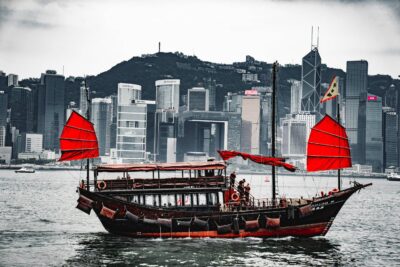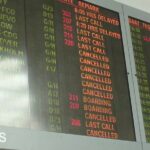In order to gradually resume cross-border travel without raising the risk of COVID-19 outbreaks on the mainland, the Hong Kong Special Administrative Region (HKSAR) government is making every effort to discuss arrangements with the central government, according to the SAR’s Chief Executive John Lee on Wednesday.

On Wednesday, Lee replied to the widely discussed issue of the resumed travel between Hong Kong and the mainland and provided an overview of some recent preparations in his first policy talk as chief executive. He emphasized how crucial it is for Hong Kong to maintain ties with the mainland as well as with other nations.
We’re talking about resuming cross-border travel with the mainland gradually and methodically, Lee remarked. The initial objective is to conduct a “pre-quarantine” in Hong Kong.
In order to prevent the spread of COVID-19 outbreaks to the mainland, travelers who wish to travel from Hong Kong to the mainland will be placed in closed-loop management in Hong Kong prior to their trip, undergoing a “7+3” quarantine (seven days in a hotel and three days at home), that complies with the mainland’s epidemic prevention standards.
According to Lee, this strategy will lessen the burden on quarantine facilities and staff on the mainland and improve the safety of transit from Hong Kong to the mainland.
In addition, he stated, “subject to risk management, we are talking with the mainland about raising the compassionate quotas for outbound arrangements at Shenzhen Bay Port to meet the requirements of the people for connectivity.
The COVID-19 epidemic has had a significant negative impact on Hong Kong’s economy over the past three years, according to Lee, who also noted that the SAR government’s anti-epidemic strategy is clear and is progressing gradually with the aim of maximizing space for people’s livelihoods and economic activities.
In the three months since the new SAR administration took power, he noted, a number of risk management-based procedures to precisely prevent the disease have been established, and controls have been progressively loosened.
A significant shift was made in Hong Kong in September when the mandated hotel quarantine period was replaced with a three-day home quarantine for visiting tourists.
“On the assumption that the epidemic remains under control, the government’s course of fighting the epidemic is to keep moving forward, adjusting and optimizing measures in light of the actual situation and changes in the epidemic, to ensure that everything is done in an orderly and steady manner and to move forward gradually,” Lee said. “Hong Kong’s overarching principle in fighting the epidemic is to maximize effectiveness at minimal cost.
He also emphasized to the populace that anti-epidemic measures should not be adjusted hastily because doing so could result in hazards that are difficult to undo.




